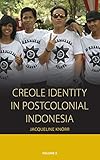Creole Identity in Postcolonial Indonesia / Jacqueline Knörr.
Material type: TextSeries: Integration and Conflict Studies ; 9Publisher: New York ; Oxford : Berghahn Books, [2014]Copyright date: ©2014Description: 1 online resource (236 p.)Content type:
TextSeries: Integration and Conflict Studies ; 9Publisher: New York ; Oxford : Berghahn Books, [2014]Copyright date: ©2014Description: 1 online resource (236 p.)Content type: - 9781782382683
- 9781782382690
- Creoles -- Indonesia -- Jakarta -- Ethnic identity
- Creoles -- Indonesia -- Jakarta -- Social conditions
- Ethnic conflict -- Indonesia -- Jakarta
- Ethnicity -- Indonesia -- Jakarta
- Postcolonialism -- Indonesia -- Jakarta
- SOCIAL SCIENCE / Anthropology / Cultural & Social
- Anthropology (General), Colonial History
- 305.8009598/22 23
- online - DeGruyter
| Item type | Current library | Call number | URL | Status | Notes | Barcode | |
|---|---|---|---|---|---|---|---|
 eBook
eBook
|
Biblioteca "Angelicum" Pont. Univ. S.Tommaso d'Aquino Nuvola online | online - DeGruyter (Browse shelf(Opens below)) | Online access | Not for loan (Accesso limitato) | Accesso per gli utenti autorizzati / Access for authorized users | (dgr)9781782382690 |
Frontmatter -- Contents -- List of Illustrations -- Acknowledgements -- Introduction -- Chapter 1. Creole Identity in Postcolonial Context -- Chapter 2. Jakarta, Batavia, Betawi -- Chapter 3. Orang Betawi versus Orang Jakarta -- Chapter 4. Suku bangsa Betawi: Integration and Differentiation of Ethnic Identity -- Chapter 5. Betawi versus Peranakan -- Chapter 6. Orang Betawi versus Orang Indonesia: The Connection between Ethnic Diversity and National Unity -- Chapter 7. Betawi Politics of Identity and Diff erence -- Conclusion. Towards an Open End -- Bibliography -- Index
restricted access online access with authorization star
http://purl.org/coar/access_right/c_16ec
Contributing to identity formation in ethnically and religiously diverse postcolonial societies, this book examines the role played by creole identity in Indonesia, and in particular its capital, Jakarta. While, on the one hand, it facilitates transethnic integration and promotes a specifically postcolonial sense of common nationhood due to its heterogeneous origins, creole groups of people are often perceived ambivalently in the wake of colonialism and its demise, on the other. In this book, Jacqueline Knörr analyzes the social, historical, and political contexts of creoleness both at the grassroots and the State level, showing how different sections of society engage with creole identity in order to promote collective identification transcending ethnic and religious boundaries, as well as for reasons of self-interest and ideological projects.
Mode of access: Internet via World Wide Web.
In English.
Description based on online resource; title from PDF title page (publisher's Web site, viewed 25. Jun 2024)


